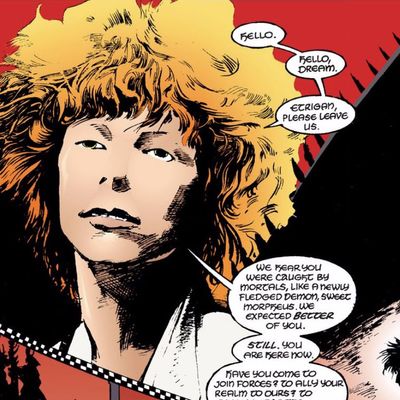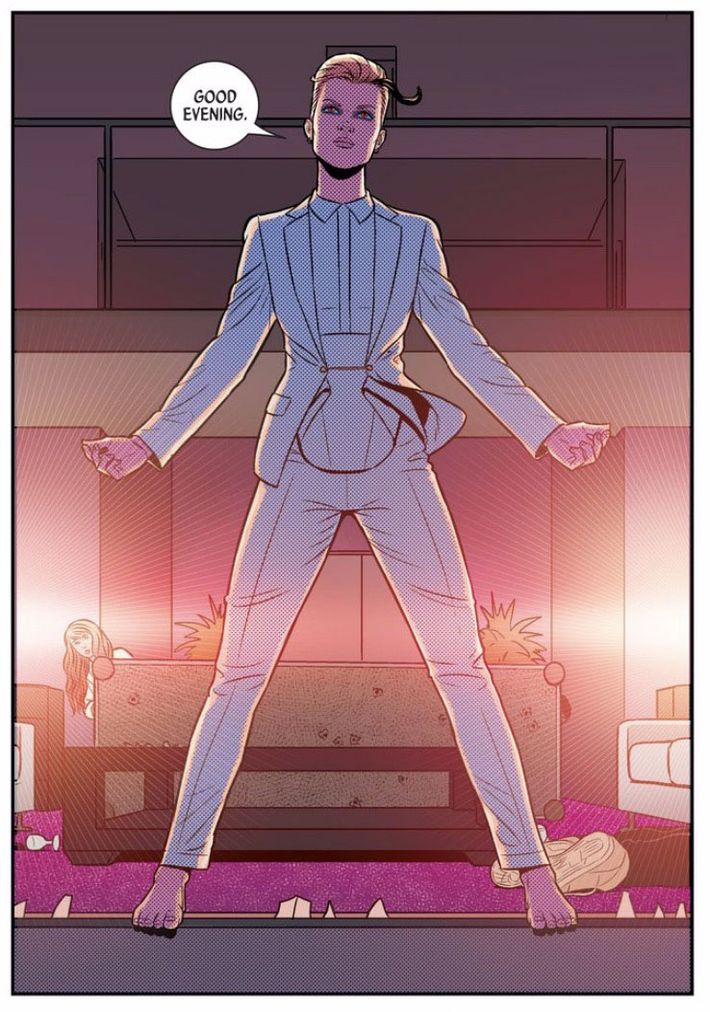
In the late 1980s and early ’90s, Satan was a recurring character in comics writer Neil Gaiman’s fantasy opus Sandman. This interpretation of Lucifer was effortlessly suave, titillatingly charismatic, and just the right amount of sinister. So Gaiman had a very simple, entirely reasonable instruction for the artists who drew the character.
“Neil was adamant that the Devil was David Bowie,” recalled artist Kelley Jones in an interview about his work on Sandman. “He just said, ‘He is. You must draw David Bowie. Find David Bowie, or I’ll send you David Bowie. Because if it isn’t David Bowie, you’re going to have to redo it until it is David Bowie.’ So I said, ‘Okay, it’s David Bowie.’”
Decades later, writer Kieron Gillen and artist Jamie McKelvie wanted to craft their own manifestation of Lucifer in their hit comic The Wicked + The Divine — in this case, she’d be an androgynous and pansexual woman who’s shockingly good at convincing you to make the most indulgently dangerous decisions. So, of course, they shamelessly stole her likeness from the Thin White Duke. In honor of Bowie’s untimely death yesterday, Gillen even wrote a little side story for their Lucifer in which she meets Bowie, declaring, “Everyone says ‘be reasonable.’ But then I look at you, and everything you’ve achieved, and know that ‘reasonable’ is defeatist.”

Lucifer’s words could stand in for the internal monologues of awkward nerds around the world today. Few mainstream figures have cast so long a shadow in the world of non-mainstream culture. To wit: The geek-news site Bleeding Cool just published a roundup of comics creators, insiders, and critics publicly mourning Bowie. It’s absolutely worth reading — but block off some time, as it’s a lot longer than you might expect.
Then again, of course you should expect that kind of grieving from dweebs who bury themselves in all things fantastical and high-concept. David Bowie was nerddom’s impeccably styled patron saint. In the coming days and weeks, he’ll be compared to other departed musical megaliths, from Lou Reed to Otis Redding to John Lennon. And, yes, he was as sonically influential as all of them. But would Reed have dressed up as an effete Goblin King in Labyrinth? Would Redding have ever starred in The Man Who Fell to Earth? Would Lennon, donned in drag, have played anthemic story-songs about being a gender-fluid extraterrestrial? Only Bowie was crazy enough.
And the visuals! No wonder writer Sean T. Collins had such an easy time getting nearly 100 cartoonists to draw Bowie a few years back. Here was a guy who looked like he stepped out of a Curt Swan story about the spacefaring Legion of Super-Heroes: facial features both humanoid and otherworldly, limbs jangly but athletic, uniforms so outlandish that you couldn’t help imagining what you’d look like in them. Here was a guy who was obsessed with sci-fi and spoke in the pithy riddles of an Arthur C. Clarke alien, an international megastar who once gave a quote to the creator of an abstract graphic novel in which he said, “I always had a repulsive need to be something more than human. I felt very puny as a human. I thought, ‘Fuck that. I want to be a superhuman.’”
Therein lies the key. What made him so important to geeks was his utter lack of shame. As has been noted countless times, sci-fi, fantasy, and superhero fiction are especially appealing to those who feel like they live and think in society’s margins. If you’ve felt powerless in your daily life, you can draw strength from tales of strange power — especially power that allows you to escape the prison of your mild-mannered identity and become something more. A caped crusader or messianic alien doesn’t try to fit into a box; he/she/it inspires people to be a little better by embracing their weirdness. That’s what Bowie did every time he crooned in character to a crowd.
One last example of geeks drawing Bowie comes to mind. Adult Swim’s The Venture Bros. is a cartoon that aspires to mash up and celebrate every possible nerdy obsession, and when its creators revealed the identity of the Sovereign, a superpowered and benevolently megalomaniacal gentleman criminal, they chose to have him be David Bowie. Not just modeled after him; actually him.* At one point, when a character asks who he is, he replies, “Just some bloke who wanted to be anyone but himself.”
You can read that as a depressing statement. But for all of us weirdos who have dreamed of donning a Lycra jumpsuit and flying away from the painful existence that fate has dealt us, it’s a statement of hope. You can be something the naysayers will call ridiculous — and you can be beloved for it. Your strangeness can change the world. It’s wonderful to be different. Until people can shoot lasers from their eyes, David Bowie will have been the closest thing to a real-life superhero we ever got.
*An earlier version of this post incorrectly said the Venture Bros. character was not explicitly named David Bowie.


